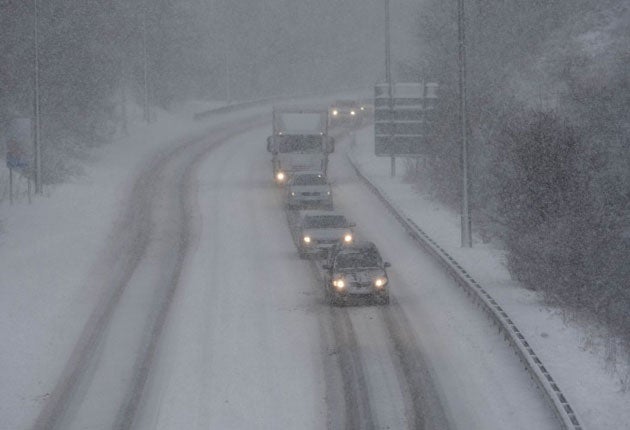Heavy snow plunges Britain back into chaos
Return to work after Christmas break hampered by severe blizzards

The post-Christmas comedown was made all the more miserable for thousands yesterday as heavy snowfall caused the number of vehicle breakdowns to more than double.
The snow was expected to reach up to 25cm (10in) in the worst affected areas of Wales and the West Midlands overnight, and up to 15cm in hilly parts of the North-west and East Midlands. The Met Office issued severe weather warnings for Wales and much of England, with higher ground expected to experience the heaviest snowfall.
Dave Britton, a forecaster at the Met Office, said that the snow was about as bad as last Monday's, which brought chaos to the country's roads and transport networks.
"It's about comparable to last week. It's difficult to say though, as it's regions that weren't overly affected last time," he said. "The worst snow is going to be across parts of the West Midlands and mid and South Wales, where there could be up to 20 to 25cm of snow."
Mr Britton added that further outbreaks of snow, sleet and rain were expected today and, while the Met Office did not plan to issue any additional weather warnings for other parts of the country, it had not been ruled out.
As the snow began to fall, the AA said it expected to attend more than 18,000 breakdowns across the country yesterday – more than double the 8,500 it deals with on an average Tuesday. By 3pm it had dealt with 14,000 breakdowns, with calls being received at a rate of around 1,100 each hour – mostly from South Wales, Gloucestershire and northern Scotland.
Gavin Hill-Smith, of the AA, said: "What we found last week, particularly on that Monday, was that the snow fell nationally and very, very heavily in a short space of time. Today I think people are better prepared for it – they have had a week of dealing with the conditions."
According to the AA, the most common reasons for callouts in snowy weather are low-speed collisions with other cars or street furniture, along with flat batteries. The service yesterday dispatched its fleet of specially adapted four-wheel-drive vehicles to some of the worst-hit regions.
A series of accidents led to lane closures and part-closures of several motorways and A-roads across the country. But despite the trouble on the roads, the AA stopped short of advising drivers to remain at home. "If people are going to drive sensibly according to the conditions and are properly equipped, there's no reason why they shouldn't travel, but safety has to come first. Even if the people know the roads particularly well they shouldn't be complacent," Mr Hill-Smith said.
The Highways Agency issued a statement that it was prepared to deal with the extreme weather. "Our salt spreaders and snow ploughs have been working across the country and will continue to operate for as long as the cold weather continues," it said.
Not all drivers appeared confident in the agency's ability to deal with the snow, however. Supermarkets yesterday reported a huge increase in the demand for salt as drivers used it as makeshift road grit. Sales of Sainsbury's rock salt were up 900 per cent on the beginning of last week.
The bookmaker William Hill is now offering 16/1 odds, from an original 33/1, that snow will fall on Big Ben as it rings midnight on 31 December.
Join our commenting forum
Join thought-provoking conversations, follow other Independent readers and see their replies
Comments
Bookmark popover
Removed from bookmarks